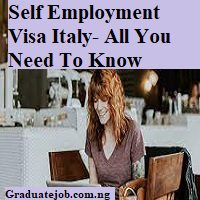The self employment visa in Italy gives individuals a unique opportunity to start their own businesses or work as freelancers in the country. It enables foreign nationals to pursue their entrepreneurial dreams while enjoying Italy’s rich culture and vibrant economy. In this detailed article, we will review everything you need about the self-employment visa in Italy.
This article will give you a thorough grasp of how to handle the self-employment visa procedure and launch on your professional path in Italy, from eligibility requirements and application process to necessary paperwork and key considerations.
READ MORE: Vocational Schools In Japan For International Students
Eligibility requirement of self employment visa Italy
Applicants must meet certain criteria that show their ability to develop and maintain a profitable business or work as a freelancer to be eligible for the self-employment visa in Italy. Here are some important eligibility criteria:
1. Business Plan: You must submit a clear and well-structured business plan describing your planned business activity in Italy. The strategy should include a market study, financial estimates, marketing tactics, and a description of how the company will contribute to the Italian economy.
2. Investment capital: You must show they have the money to start and run a business in Italy. The exact amount will vary depending on the nature of the firm and its location, but minimum investment capital is generally necessary.
3. Professional experience: You must have relevant professional experience or qualifications in the field where you wish to work in Italy. This helps to guarantee that you have the skills and expertise required to run your firm successfully.
4. Education background: While not necessary, having an educational background relevant to the targeted business industry helps boost the application. Degrees or certifications in the relevant field may be required to establish the applicant’s knowledge and ability.
Others include
1. Market viability: The applicant’s proposed business or freelance activity should have the potential to be economically viable and contribute positively to the local economy. You must conduct market research and demand for your products or services.
2. Compliance with Italian Laws: Applicants must follow all applicable Italian laws and regulations pertaining to commercial operations, taxes, and legal requirements. Ensuring that the intended business activity complies with Italian laws and does not violate any limits or prohibitions is critical.
It’s worth mentioning that the eligibility conditions in Italy can vary depending on the location or province. Certain business sectors may be subject to additional regulations or incentives in some locations.
READ MORE: How To Apply For Spain Digital Nomad Visa
How to apply for Self Employment Visa Italy
1. Research and prepare: Begin by extensively researching the self-employment visa’s requirements and standards. Understand the eligibility requirements, required documentation, and application process. Understanding the business or freelance activity you intend to pursue in Italy is critical.
2. Create a business plan: Make a detailed business plan with your intended activities, market analyses, financial estimates, and marketing tactics. Ensure your plan is well-structured and proves your company’s feasibility and potential in the Italian market.
3. Gather necessary documents: Gather all necessary documents to process the visa. You need a valid passport, passport-sized pictures, proof of professional qualifications, educational diplomas, financial documents, a business plan, and proof of adequate cash to support yourself and the business.
4. Establish a legal presence: Create a legal presence in Italy by registering your company with the appropriate authorities. Obtaining a Partita IVA (VAT number) and registering with the Chamber of Commerce or other relevant authorities may be required.
5. Submit your application: Submit your visa application to the Italian embassy or consulate in your native country or the country where you have your legal abode. Complete the application form completely and attach all relevant documents. Pay the applicable visa application fees.
6. Attend visa interview: You may be needed to attend an interview at the embassy or consulate in some situations. To ensure compliance with visa regulations, be prepared to answer inquiries about your company plan, financial resources, and ambitions.
7. Obtain a residency permit: Once in Italy, you must apply for a residency permit (Permesso di Soggiorno) within a certain time frame. This permission permits you to remain and work in the country as self-employed legally. To apply for a residency permit, visit your local Questura (police headquarters) or relevant immigration office.
READ MORE: Top Recruitment Companies In Canada
Financial Requirements of Self-Employment Visa Italy
1. Minimum investment capital or turnover: Certain company sectors in Italy may be subject to a minimum investment capital or needed turnover. The sum varies and is frequently set by local governments. Investigating the specific financial needs of your chosen business activity and location is critical.
2. Financial statement: To show the financial health and viability of their business, applicants must present financial documents such as balance sheets, income statements, and cash flow statements. These statements should represent the applicant’s financial situation as well as his or her ability to sustain the firm.
3. Proof of sufficient funds: Applicants must show they have enough money to support themselves and their firm throughout the early phases. This may contain bank records or other financial documentation showing you have sufficient resources to meet living expenditures and any prospective financial issues.
4. Financial projections in a company plan: A comprehensive company plan should include financial projections highlighting estimated revenues, expenses, and profitability. These estimates should align with the business’s financial requirements and reflect a sustainable financial strategy.
5. Personal financial stability: Applicants may have to provide extra documents such as tax records, job contracts, or other sources of income to prove they have the means to maintain themselves and the firm.
Final Thoughts
The self-employment visa in Italy allows people to pursue their entrepreneurial dreams and work as freelancers there. Applicants can confidently traverse the visa application procedure if they grasp the qualifying criteria, the application process, the documentation, and the financial requirements.
To ensure a smooth and successful application, it is critical to undertake thorough research, build a good business strategy, and gather all relevant papers. Seeking advice from legal or commercial advisers might also be advantageous. With proper planning and adherence to laws, the self-employment visa provides the opportunity to create and build a business in Italy’s economically vibrant environment.






